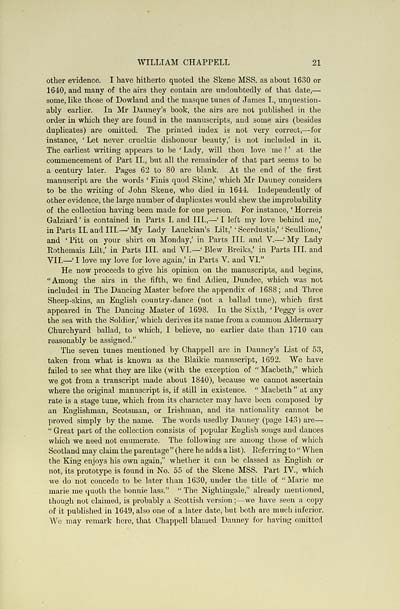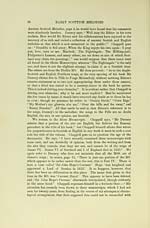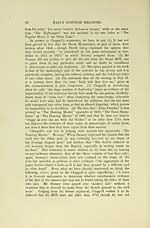Glen Collection of printed music > Printed text > Early Scottish melodies
(43) Page 21
Download files
Complete book:
Individual page:
Thumbnail gallery: Grid view | List view

WILLIAM CHAPPELL 21
other evidence. I have hitherto quoted the Skene MSS. as about 1630 or
1640, and many of the airs they contain are undoubtedly of that date, —
some, like those of Dowland and the masque tunes of James I., unquestion-
ably earlier. In Mr Dauney's book, the airs are not published in the
order in which they are found in the manuscripts, and some airs (besides
duplicates) are omitted. The printed index is not very correct, — for
instance, ' Let never crueltie dishonour beauty,' is not included in it.
The earliest writing appears to be ' Lady, will thou love me ? ' at the
commencement of Part II., but all the remainder of that part seems to be
a century later. Pages 62 to 80 are blank. At the end of the first
manuscript are the words ' Finis quod Skine,' which Mr Dauney considers
to be the writing of John Skene, who died in 1644. Independently of
other evidence, the large number of duplicates would shew the improbability
of the collection having been made for one person. For instance, ' Horreis
Galziard ' is contained in Parts I. and III.,^' I left my love behind me,'
in Parts II. and III. — 'My Lady Lauckian's Lilt,' ' Scerdustis,' ' Scullione,'
and 'Pitt on your shirt on Monday,' in Parts III. and V. — 'My Lady
Eothemais Lilt,' in Parts III. and VI. — ' Blew Breiks,' in Parts III. and
VII. — ' I love my love for love again,' in Parts V. and VI."
He now proceeds to give his opinion on the manuscripts, and begins,
"Among the airs in the fifth, we find Adieu, Dundee, which was not
included in The Dancing Master before the appendix of 1688 ; and Three
Sheep-skins, an English country-dance (not a ballad tune), which first
appeared in The Dancing Master of 1698. In the Sixth, ' Peggy is over
the sea with the Soldier,' which derives its name from a common Aldermary
Churchyard ballad, to which, I believe, no earlier date than 1710 can
reasonably be assigned."
The seven tunes mentioned by Chappell are in Dauney's List of 53,
taken from what is known as the Blaikie manuscript, 1692. We have
failed to see what they are like (with the exception of " Macbeth," which
we got from a transcript made about 1840), because we cannot ascertain
where the original manuscript is, if still in existence. " Macbeth " at any
rate is a stage tune, which from its character may have been composed by
an Englishman, Scotsman, or Irishman, and its nationality cannot be
proved simply by the name. The words usedby Dauney (page 143) are — •
" Great part of the collection consists of popular English songs and dances
which we need not enumerate. The following are among those of which
Scotland may claim the parentage " (here he adds a list). Pbcf erring to " When
the King enjoys his own again," whether it can be classed as English or
not, its prototype is found in No. 55 of the Skene MSS. Part IV., which
we do not concede to be later than 1630, under the title of "Marie me
marie me quoth the bonnie lass." " The Nightingale," already mentioned,
though not claimed, is probably a Scottish version ; — we have seen a copy
of it published in 1649, also one of a later date, but both are much inferior.
We may remark here, that Chappell blamed Dauney for having omitted
other evidence. I have hitherto quoted the Skene MSS. as about 1630 or
1640, and many of the airs they contain are undoubtedly of that date, —
some, like those of Dowland and the masque tunes of James I., unquestion-
ably earlier. In Mr Dauney's book, the airs are not published in the
order in which they are found in the manuscripts, and some airs (besides
duplicates) are omitted. The printed index is not very correct, — for
instance, ' Let never crueltie dishonour beauty,' is not included in it.
The earliest writing appears to be ' Lady, will thou love me ? ' at the
commencement of Part II., but all the remainder of that part seems to be
a century later. Pages 62 to 80 are blank. At the end of the first
manuscript are the words ' Finis quod Skine,' which Mr Dauney considers
to be the writing of John Skene, who died in 1644. Independently of
other evidence, the large number of duplicates would shew the improbability
of the collection having been made for one person. For instance, ' Horreis
Galziard ' is contained in Parts I. and III.,^' I left my love behind me,'
in Parts II. and III. — 'My Lady Lauckian's Lilt,' ' Scerdustis,' ' Scullione,'
and 'Pitt on your shirt on Monday,' in Parts III. and V. — 'My Lady
Eothemais Lilt,' in Parts III. and VI. — ' Blew Breiks,' in Parts III. and
VII. — ' I love my love for love again,' in Parts V. and VI."
He now proceeds to give his opinion on the manuscripts, and begins,
"Among the airs in the fifth, we find Adieu, Dundee, which was not
included in The Dancing Master before the appendix of 1688 ; and Three
Sheep-skins, an English country-dance (not a ballad tune), which first
appeared in The Dancing Master of 1698. In the Sixth, ' Peggy is over
the sea with the Soldier,' which derives its name from a common Aldermary
Churchyard ballad, to which, I believe, no earlier date than 1710 can
reasonably be assigned."
The seven tunes mentioned by Chappell are in Dauney's List of 53,
taken from what is known as the Blaikie manuscript, 1692. We have
failed to see what they are like (with the exception of " Macbeth," which
we got from a transcript made about 1840), because we cannot ascertain
where the original manuscript is, if still in existence. " Macbeth " at any
rate is a stage tune, which from its character may have been composed by
an Englishman, Scotsman, or Irishman, and its nationality cannot be
proved simply by the name. The words usedby Dauney (page 143) are — •
" Great part of the collection consists of popular English songs and dances
which we need not enumerate. The following are among those of which
Scotland may claim the parentage " (here he adds a list). Pbcf erring to " When
the King enjoys his own again," whether it can be classed as English or
not, its prototype is found in No. 55 of the Skene MSS. Part IV., which
we do not concede to be later than 1630, under the title of "Marie me
marie me quoth the bonnie lass." " The Nightingale," already mentioned,
though not claimed, is probably a Scottish version ; — we have seen a copy
of it published in 1649, also one of a later date, but both are much inferior.
We may remark here, that Chappell blamed Dauney for having omitted
Set display mode to: Large image | Transcription
Images and transcriptions on this page, including medium image downloads, may be used under the Creative Commons Attribution 4.0 International Licence unless otherwise stated. ![]()
| Special collections of printed music > Glen Collection of printed music > Printed text > Early Scottish melodies > (43) Page 21 |
|---|
| Permanent URL | https://digital.nls.uk/91348090 |
|---|
| Description | Scottish songs and music of the 18th and early 19th centuries, including music for the Highland bagpipe. These are selected items from the collection of John Glen (1833 to 1904). Also includes a few manuscripts, some treatises, and other books on the subject. |
|---|
| Description | The Glen Collection and the Inglis Collection represent mainly 18th and 19th century Scottish music, including Scottish songs. The collections of Berlioz and Verdi collected by bibliographer Cecil Hopkinson contain contemporary and later editions of the works of the two composers Berlioz and Verdi. |
|---|

